Peter MALONE
Saturday, 18 September 2021 19:22
Dead Heat
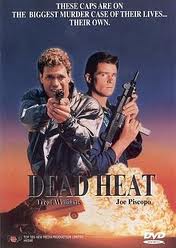
DEAD HEAT
US, 1988, 83 minutes, Colour.
Treat Williams, Joe Piscopo, Lindsay Frost, Darren McGavin?, Vincent Price.
Directed by Mark Goldblatt.
Dead Heat is an oddball police thriller. It looks and sounds like the work of young film-makers, tongue-in-cheek, satirical with spoof ideas as well as enjoying the genre of police investigations as well as science fiction. The plot defies credibility. It opens with a robbery at a jewellery store and attack by the police (who seem to be massacred unmercifully). Two police appear as heroes and discover that the robbers are already dead and have been injected with a chemical to make them live again. Just when the audience was least expecting it, Treat Williams as the hero is killed - and is brought to life again. He then has 12 hours to investigate what really happened as his body decays.
His wisecracking buddy, Joe Piscopo, also gets killed at some stage and reappears. The heroine, rather glamorous, we find is also resuscitated and towards the end of the film breaks up and disintegrates.
The film is glossy in its production, uses the conventions of the police thriller - but also has wisecracking cynical dialogue, especially from the heroes and from Darren McGavin? who turns out to be the arch villain. To give atmosphere to the film, Vincent Price appears as the scientist who invented the process.
There is stunt work, a range of special effects for monstrous-looking creatures as well as for decaying hero and heroine. Oddball.
1. Impact of the film? The mind of the film-makers? Serious/send-up spoof mentality? Police thriller? Science fiction?
2. City locations, laboratories? Special effects and make-up? Stunt work? Musical score?
3. The title and its ambiguities?
4. Roger and Doug, on patrol, their action in the jewellery raid? The discovery of the dead bodies? Rebecca and her help at the morgue? Dr McNab? Going to the laboratories, meeting Randi? The confrontation, Roger's death, revived? The Frankenstein laboratory echoes? The discussions about Roger being dead? Doug and his grief, hopes? The investigation? The monsters revived? Randi and her lies, the tape with Dr Loudermilk? McNab? and his interference? The discovery about the chemicals, the processes? Randi and her collapse? The attempts on their lives? Doug's death? The fights with the monsters - and their electrocution, drowning? Roger and his disintegration? The discussion with Dr Loudermilk to help people become immortal? The final confrontation and the spoof ending? The characters of Doug and Roger?
5. Randi, the PR guide, her lies, her glamour, her disintegration? The tape for Dr Loudermilk?
6. Rebecca, her work on the corpses, suspicions, helping the men, her death?
7. Dr McNab? - and his reasonableness, his disclaimers, the irony that he was the villain?
8. Dr Louder milk, the tape, his speech to the elderly wealthy? Vincent Price in the role?
9. The implausibility of the plot? The blend of tongue-in-cheek use of conventions with the serious visual style of the film? Did it work?
Published in Movie Reviews
Published in
Movie Reviews
Tagged under
Saturday, 18 September 2021 19:22
Dead Again
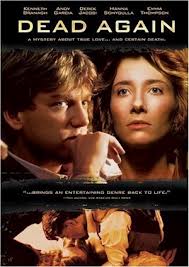
DEAD AGAIN
US, 1991, 108 minutes, Colour.
Kenneth Branagh, Emma Thompson, Andy Garcia, Derek Jacobi, Robin Williams, Wayne Knight, Hanna Schygulla.
Directed by Kenneth Branagh.
Dead Again is a very entertaining murder mystery. It is very stylishly made, directed by Kenneth Brannagh, his working for his Renaissance Theatre Company. Brannagh had achieved fame as an actor, on stage and on television (Fortunes of War, Boy from the Bush) and had appeared in some films (A Month in the Country). However, he received international recognition with his 1989 version of Henry V, gaining an Oscar nomination for best director.
His next film project was this murder story, Dead Again. It was written by Scott Frank (Little Man Tait) with a strong plot and excellent twists as well as an enjoyable gallery of characters and references to many films of the old tradition, especially Citizen Kane and Hitchcock films like Rebecca, Spellbound, Dial M for Murder, Psycho. There is also a screen quotation from Sorry, Wrong Number towards the end of the film.
Brannagh acts two roles with great skill, a Germanic musician in Los Angeles of the '40s and a private eye, modern '90s style, in Los Angeles. His wife Emma Thompson also portrays two people, a British pianist of the '40s and an American woman who has amnesia in the '90s. In the supporting cast are Andy Garcia, Hannah Schygulla, Campbell Scott. But a very interesting performance is offered by Derek Jacobi, who has worked with Brannagh on stage and television. Jacobi also does a quotation of himself as I, Claudius towards the end of the film. All the references, the strong performances, the sometimes entertainingly flip dialogue, the use of old-style angles, the pounding score echoing Miklos Rosza or Bernard Herman's score for Hitchcock's films, all combine to make it entertaining. At times it goes over the top, especially in the finale. However, it is clear that this is intended and is part of the entertainment.
The theme underlying the murder mystery is that of reincarnation and poetic justice - and the plot ultimately gives this some plausibility.
1. Entertaining thriller, comedy touches? A satisfying blend of excitement, action, psychology and humour?
2. The work of Kenneth Brannagh, his skills as director, as actor? Working with Emma Thompson? The double performances - a complete tour de force?
3. Modern Los Angeles, colour and light, the streets, the houses and their sinister angles? The interiors and exteriors? The tower and the house? The contrast with the black and white photography of Los Angeles in the '40s: interiors, the concert hall, the nightclub and the dancing, the wedding sequence, the masked party? The musical score with its dramatic atmospherics as well as its romantic tones?
4. The homage to thrillers of the past? A pastiche of various characteristics of classic movies? The references to Citizen Kane, Psycho, Spellbound, Rebecca, Dial M for Murder, Sorry, Wrong Number, I, Claudius - and others?
5. The tone of the title, the theme of reincarnation, made plausible, the purpose of reincarnation - and true justice?
6. The introduction to the film, Roman in the shadows, the haircut, the scissors, the prison atmosphere? Baker present, the interview, the whisper in Baker's ear, taking the scissors? The long walk up the corridor to his execution? Going towards Margaret, attacking her? Grace waking in fright?
7. The mystery of Margaret/Grace? Grace, waking up in bed, the screams and fear? The nuns and their concern? The priest and his attitude - and harshly wanting her to leave? The calling on Mike Church (and his name)? Their persuading him to investigate, taking Grace to the precinct, the echoes of the snake pit and the institution and his not wanting her to be there? Taking her home? His concern and interest? Her bewilderment, mute? Settling in - and the further nightmare, Church responding and concerned? His telling the story to Pete - and Pete's reaction? Telling the grim story of the man's mutilation of his arm - but the moral behind it? Recovery?
8. Kenneth Branagh skill in impersonating the Los Angeles detective? His name, the orphanage, his working for the priest, the concern of the nun? His personality, the phone call, glib about women? Driving carelessly? With Grace, taking her to the police, taking her back home, trying to console her? The photograph, the papers, the information? Pete's story? The nutty phone calls identifying the woman?
9. Derek Jacobi's presence and style as Franklyn Matson? His arrival, dithering manner, looking at the furniture and the antiques? His connection with the case? His skills in hypnotism? The techniques, the effect, taking Grace back, making her become Margaret? The long flashback and its releasing effect on Grace? Their visit to his place, his calling to his mother (and echoes of Psycho)? The woman being hypnotised - and his questions about the antiques in the White House? His taking Margaret back further? Telling them the truth about Roman and Margaret, the Life magazine (and charging for it)?
10. The story of Roman and Margaret: their first encounter, her playing and winking, his conducting? Roman as sinister European, charm? Their going out, dancing? His writing the opera? The background of his story of escape from the Nazis? Inger (resembling Mrs Danvers in Rebecca) and her son Frankie, their helping him, their place in the household? The proposal and the marriage? The celebrations? Gray Baker and his presence, his interviewing Margaret? His criticisms? The marriage and its progress, the gift of the anklet? The masked party, Roman and his need for money, the refusals of the entrepreneurs to lend? Writing for the movies - and the snide comment about composers not being celebrities? Baker at the party, asking Margaret about her marriage, looking at the anklet? Roman's angers? The camera focusing on the scissors in the household - and the scissors theme? Margaret cutting Roman's hair?
11. Baker - seeing him in the first nightmare, the credits collage of the newspapers talking about the murder, Roman's arrest and trial, the conviction? The death penalty? The collage on the prison wall? Baker's war background, his drinking, the visit to the wedding, his friend? Meeting Roman and Margaret? His regretting the war being over? The masked party, talking with Margaret, the anklet? Roman's jealousy? His phoning Margaret and giving her information about Roman's lack of money? The visit to the prison? Mike Church finding him in the old people's home? His age, still smoking - and the macabre humour of his needing the machine for his voice - and smoking through the hole in his neck? The truth about Roman and the whisper, kissing him? Promising that justice would be done?
12. The fiance coming and recognising Grace, his performance, persuasive, Grace bewildered, the effect on Mike Church? The discovery about the gloves - and his being exposed? Church pursuing him? His being an actor?
13. Inger and Frankie, the Rebecca parallels, Inger as the aloof housekeeper, her story? Her seeming jealousy of Roman and Margaret? Margaret and her accusing Frankie of stealing? Her seeming to be unjust? Frankie's anger? His stammering? The discovery of Inger, in the back room watching television? Her telling the truth? Roman playing the piano downstairs, Frankie killing Margaret? The gradual audience understanding that Frankie was Matson? Grace in danger? Inger in her old age, watching the television - and Sorry, Wrong Number? Frankie coming back, her not being able to conceal the truth any longer? His putting her to bed, smothering her?
14. Pete, collaborating with Church, information, his style, the story and the possibilities of regaining memory? His clumsiness? His bursting in at the crucial confrontation?
15. Mike, his growing fears, his own involvement in the story of Roman and Margaret? His not wanting to be Roman? His being Margaret - two halves of the one person? Matson hypnotising him? His bewilderment? Grace's fear of him?
16. The growing bond between Grace and Church, their talking, walking together, sharing memories, her recovering? Her gaining her speech? Her dependence on him, the sexual liaison? The sudden coming of the actor? Her growing fears, trusting Matson, mistrusting Church? Her going to the tower - and the build-up of the confrontation of the heroine in the tower, in peril?
17. Robin Williams' guest appearance as the psychiatrist barred from practice? His initial remarks, working in the freezer, the supermarket? The relationship with Church - their talking things over, his glib remarks - yet with their wisdom? His professional misconduct yet his skills? The return of Church and Grace, talking about reincarnation, psychology and trauma? His reinforcing their trust in Matson? Robin Williams' comic style and his contribution to the mood of the film?
18. The final confrontation, the pursuit, Grace's bewilderment, the guns, the scissors? The climax in the tower? The macabre paintings and sculptures of scissors all round the world? The huge scissors - ready for Matson to fall on them? The fight, the conflict? Matson's death?
19. Reincarnation, the mysterious origins of Mike and Grace? Their destiny to meet each other, to meet Frankie? For justice to be done in the next generation? A plausibility for reincarnation?
20. The camera styles, the stylish photography, the editing and pace? The over-the-top style - and audiences accepting it and its mood? The writ of the film?
Published in Movie Reviews
Published in
Movie Reviews
Tagged under
Saturday, 18 September 2021 19:22
Deadly Lessons
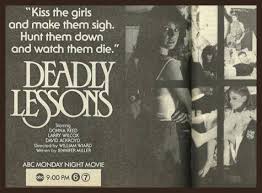
DEADLY LESSONS
US, 1983, 100 minutes, Colour.
Donna Reed, Larry Wilcox, David Aykroyd, Diane Franklin, Ally Sheedy, Bill Paxton, Ellen Geer.
Directed by William Wiard.
Deadly Lessons is a thriller, a murder mystery about a series of deaths in an exclusive California girls' school. Donna Reed, making a momentary comeback in films, plays the headmistress. Amongst the students are newcomers Diane Franklin and Ally Sheedy, who were to later make a career for themselves.
The film is a telemovie, therefore rather restrained in its presentation of horror and terror. (It indicates what might have been a trend in the cinema, except for the yen for explicit gore.)
The film is conventional in its way, interesting while it is on the screen - and with an unexpected twist.
1. Enjoyable murder mystery? In the tradition of murder mysteries and investigations?
2. The exclusive girls' school, the building, the grounds? Authentic? Musical atmospheric score? The stars?
3. Miss Wade, her prim aspects, her relationship with Ferrar? Clash with the police, not wanting the media? Her attitude towards the girls, likes and dislikes? The revelation of the truth? Overhearing Keppler? Her explanation? The loss of the school - and her son's revenge?
4. Keppler as the young policeman, attractive and ingratiating, the audience on his side, his investigations and detail, with subordinate officers, with authorities? Questions? How credible the revelation that he was the killer, his confrontation with Stephanie? Being overheard, the arrest?
5. Stephanie as heroine, audiences identifying with her? On a scholarship, nervous arrival, the taxi, the reaction of the girls? Her clothes? Friendship with Eddie? The friendship with some of the girls, classes, the red ink, the fight? Under suspicion? Her explanations? With Marita and Callie? The further deaths? The confrontation with Keppler, the fight, her being saved?
6. Marita and Callie, friendship with Stephanie, going out at night to see the boys, the attack on Callie, Mr Hartigan and his continual watching, taking Marita, the explanation of his devotion to her mother, her fear, rescue, turning up the record?
7. Althea and the other girls with problems? Temba and her being killed, Shamli and her arrogance, her horse? The reasons for their deaths?
8. Hartigan, on the prowl, watching, taking Marita, his explanations - and infatuation with her mother?
9. Eddie as suspect, his brother being arrested, his friendship, finding the electric spur for Stephanie's horse? The happy ending?
10. The police chief, wanting to hush things up? The assistant, his investigations, arresting Keppler?
11. Popular whodunnit? Themes of class distinctions and affluence? Arrogance? Retribution and the sins of the past? Madness?
Published in Movie Reviews
Published in
Movie Reviews
Tagged under
Saturday, 18 September 2021 19:22
Day of Wrath
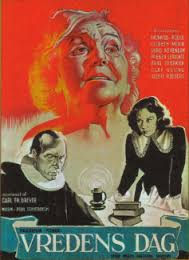
DAY OF WRATH
Denmark, 1943, 105 minutes, Black and white.
Thorkild Roose, Lisbeth Movin, Sigrid Neiiendam, Preben Lerdoff Rye, Anna Svierkier.
Directed by Carl Dreyer.
Day of Wrath is the 1943 masterpiece by classic director Carl Theodor Dreyer. Directing in Denmark from the silent era, he made such films as Master of the House, Michael, and also the classic Passion of Joan of Arc. He moved into the sound era with the film Vampyr. His other films are Ordet and his last film, Gertrud.
Dreyer is considered one of the transcendent directors (the language of Paul Schrader to describe the austere cinema of Ozu and Bresson). This is particularly clear in the subject and style of Day of Wrath. It has a post-Reformation, 17th century setting. The atmosphere is particularly religious (of the reform style). However, passion lurks beneath formality and lust and passion are currents which burst out into violence. There is religious retribution, mirroring that of the righteous in Puritan communities, with vengeance directed towards witches. The film captures a Scandinavian version of the concern about witches and witchcraft in 17th century Europe.
The reference of the title is to the mediaeval hymn for All Souls' Day (originally from the prophecies of Zephaniah): The day of wrath, the day of anger, the dreadful day of judgment.
1. The work of Carl Theodor Dreyer? His style, `transcendence'? Style and theme?
2. The atmosphere of Denmark? Scandinavia? The 17th century? The society, its grimness, austerity, religious dedication? Moral stances? Yet superstition and cruelty? The contrast between the 17th century and the 20th century? The film coming out in 1943? Its comment on the '40s and Europe in World War Two?
3. The black and white photography, the rectory, the exteriors of the town, the burning? Editing and pace? The musical score, its classic tone? The music of the hymn `Dies Irae'?
4. The title and its reference to the hymn, to the biblical texts? Its significance in relationship to God, judgment, human beings, sin, expiation, forgiveness?
5. Marte: her place in the household? A young woman of the period? The winter, the brew, cry, escape, the crowd? The background of witchcraft? The witches and their denunciation? The role of religious authorities? Her life in the rectory? Anne, the plea, hiding, caught? Absolom? Trial, the death, ceremony? The burning - the cursing and her death? The consequences?
6. The world of the rectory and religion? Absolom as a serious man? His age, love, lust? Absolom's mother and her severity? Her ruling the rectory? Clashes? Marte? The arrival, the bond? The dangers? The decisions, the death? The ministry and his fatigue? Anne and the confrontation? Bitterness? The significance of the clash, of Anne and the confrontation? Her death? Revenge?
7. Absolom's mother and her harshness, age and experience? The keys? The clash? The denunciation? Martin? Watching? Grief? The denunciation and her conquering?
8. Anne as attractive, her background, the mother, the marriage, dutiful, ideal? The mother and the keys? Martin's arrival? The song and the lyrics? Marte and her help? Marte's death? The affair, her attitude? The lyric of the song? Anne and her death? Martin and the betrayal? The trial, the question of the ordeal, the demand for the confession? The final impact?
9. Martin as a good young man, ordinary, his return, love, the affair, its effect? Death and his final stances?
10. The role of the clergy in society, worship, moral codes, severity? Witchcraft and superstition? The moral judgments? The ordeal, the executions? Witchcraft as a projection of the religious and psychological attitudes of the people? The visual imagery of religion, especially church, the altar, the bible, the crucifix?
11. The comments on European religion in society, grace and damnation, superstition and truth?
Published in Movie Reviews
Published in
Movie Reviews
Tagged under
Saturday, 18 September 2021 19:22
Days of Thunder
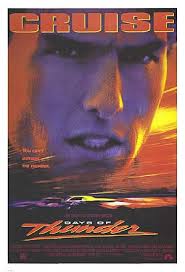
DAYS OF THUNDER
US, 1990, 107 minutes, Colour.
Tom Cruise, Robert Duvall, Nicole Kidman, Randy Quaid, Fred Dalton Thompson, Michael Rooker, Cary Elwes.
Directed by Tony Scott.
Days of Thunder has good credentials but thunder seems an overstatement. The story was devised by its star, Tom Cruise, who collaborated with writer Robert Towne (Chinatown, Personal Best, Tequila Sunrise). The screenplay is very conventional - though there are some attempts at critique of stock car drivers and their `infantile' macho attitudes.
The film is a star vehicle for Tom Cruise after his success in such films as Top Gun and Cocktail. However, he is capable of much better performances as in Colour of Money, Rain Man and his Oscar nomination in Born on the 4th of July.
Robert Duvall is steady as his trainer and Randy Quaid as the weak promoter. Nicole Kidman seems strangely out of place as a 22-year-old brain surgeon in a Daytona hospital (but still keeping her Australian accent). However, it is she who has the chance to mouth the criticisms.
The film was directed by Tony Scott and was produced by Don Simpson and Jerry Bruckenheimer, the group responsible for Cruise's success in Top Gun. However, this film is not nearly as good in characterisations, nor in action sequences. There have been much better and involving films about car racing, including Paul Newman in Winning, Steve McQueen? in Le Mans, Jeff Bridges as The Last American Hero and Bonnie Bedelia in Heart Like a Wheel.
1. Impact of the film? Drama? Stock car racing and its world?
2. The film's credentials: the background of Top Gun, the strong writer, the reliable cast?
3. Panavision photography, the American locations, the speedways? Daytona? The special effects and camerawork, especially for the car racing sequences?
4. The title, justified or not? In relation to the sport? People involved?
5. Audience response to car racing, stock car racing? The scenes of the crowds and their acclamation? The focus on drivers and their instincts and skills? Speed and danger? Competition? The crashes, possible danger? Injuries and death? The competitive nature of car racing, managers and trainers, building cars, maintenance?
6. Tom Cruise as Cole Trickle - first seen as smart and smug, self-ability, clash with Rowdy, using his car, going against orders? Tim and his promotion of him, taking him on? Harry training him - and their clashes? Rowdy and bumping him, crashes? Competitiveness? The various races, his lack of success? His trying to understand cars, Harry's help? The winning and the effect, chasing Harry? The clash with Rowdy? The injury and his going to hospital, the incident on the road with the woman disguised as the policewoman, his treatment of Claire? His backing town? His injuries, recovery, ringing Claire, dating her, the affair? Rowdy and his injuries, avoiding him? Claire persuading him to go and see Rowdy, persuade him to go for the operation? The visit to hospital, Rowdy's advice? The contrast with their clashing - especially when called by the manager of Daytona and their hiring the cars and racing roughly together? Cole and his friendship with Jenny and the children? Rowdy's operation? Making Cole reflect, Claire's criticisms? The clash with Russ Wheeler, the taunts? The races? Tim and his support of Russ, dropping Cole? Harry and his continued support? The team? The build-up to the final race, clashing with Russ, outwitting him and winning? The macho ending?
7. Harry, on his farm, Tim's approach the collage of building the car? Meeting Cole, watching him, his instinct? Taking him on? His not knowing about cars, their clashes and fights? The advice, Cole's not winning? The eventual victory? The friendship growing between the two? The joke with the policewoman? The injury, Harry in the hospital, supporting Cole, supporting Claire, the joke, apologising to her? In the background, the clashes with Tim? His own past, sense of responsibility for deaths? The son of the dead man working on the team? Changing the cars, Cole and his comeback, the clash with Tim? The final victory, his emotional response, success?
8. Tim, the used car salesman, the entrepreneur, approaching Harry, supporting Cole? The initial teamwork, the pit stop crew? Failures, success? Enjoying the success? Going cold on Cole, Russ as the competitor? The clashes with everyone else? The final race, his coming on-side?
9. Russell Wheeler, the up and coming driver, the taunts to Cole, clashing with him on the track, tricks, violence, his being outwitted and beaten?
10. Rowdy, the champion, his relationship with his wife and children? The clashes with Cole, his victories? Their fights? Being called to order, hiring the cars and bashing them as they raced each other? The macho image? The injury, rowdy in hospital, brain damage? Unwilling to go to hospital, Cole's visit, Claire's insistence and his initial suspicions of her? Going to have the operation, wanting Cole to drive for him? Financial situation?
11. The boss of Daytona, the other officials, their standards for races?
12. Claire - the Australian accent, her age, brain surgery and her expertise? No nonsense? Professional skills, interest in Cole, clashes with him? Concern about Rowdy? The dating, the affair? Her straight talk about infantile macho attitudes? Her not wanting to watch, but her going, sharing in the celebrations? (Token feminine presence in the film?)
13. The comparison of this film with others on the theme - budget and style, stars? Exploration of character? Action sequences on screen?
Published in Movie Reviews
Published in
Movie Reviews
Tagged under
Saturday, 18 September 2021 19:22
Daydream Believer
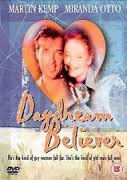
DAYDREAM BELIEVER
Australia, 1992, 82 minutes, Colour.
Miranda Otto, Martin Kemp, Gia Carides, Kerry Walker.
Directed by Kathy Mueller.
Daydream Believer is an offbeat Australian romantic comedy. It is either very fey - or somewhat silly. However, the strength of the film is in Miranda Otto's performance - for which she was nominated for an Australian Film Institute Best Actress award. She portrays a young woman who has spent a lot of time locked in a stable as a girl and who identifies more with horses than with humans. This has its unusual consequences in her adult life. Prone to accidents, she literally crashes into a millionaire theatrical entrepreneur who breeds horses. He is played by singer Martin Kemp of the group Spandau Ballet and who was one of The Craze.
The direction is by Kathy Mueller, who has directed a number of telemovies and series including The Magistrate.
1. Pleasing comedy? Fey? Silly? Portrait of Nell?
2. The title - and the song and its lyrics? The young girl, her growing up, becoming an actress - and discovering real life?
3. The country locations, the horses? The contrast with the city, the homes, clubs? The studios? The studs and the farm? The musical score and songs?
4. The prologue with Nell as a little girl, her feelings, not relating well to others, friends, classmates? Family? In the stable, the horses? Her identifying with the horses - imagining herself a horse? Behaving like a horse? The acting and visual techniques to make this credible?
5. Nell grown up, her still identifying with horses? Getting a better hold on her life? Her perspective on herself, people? Her career and hopes? Wendy and her friendship? Sharing the flat, accident-prone? The audition for the pea commercial - and her performance? Absentminded, crashing into Digby? The accidents, the cars, the driving? Trying to make up to him? Her awkward reappearances at his home, on the stud, in the stables? At the pond and falling in the mud? Her giving him advice about the horses and the breeding? Her appearance at the auction? The question of the sperm and its disappearance? Going to work in the club, the boss and his attitude, the customers? Her friend? The male strippers? The return to the stud, the comedy with the sperm? The happy ending and the relationship?
6. Digby and his background, the theatre, finance, recordings? Horse breeding? Social life, girlfriends? The accident with Nell, the encounter, her reappearances and the chaos, his reactions? The horses, the auction? The sperm? Finding Nell - what they had in common? A future?
7. Wendy and her friendship, style, acting, sharing Nell's life, work in the strippers club?
8. Digby's social milieu, its style? Friends and society? The theatre, producers, moneymaking? Backing musicals? The recording industry?
9. The world of television, auditions? Nightclubs and bars, the personnel, their lifestyle, friendship with Nell? Her taking over the performance, her compering, verve and vitality?
10. Nell and her sailing through life - the imagery of the horses? Settling down to real life or not?
Published in Movie Reviews
Published in
Movie Reviews
Tagged under
Saturday, 18 September 2021 19:22
Daybreak
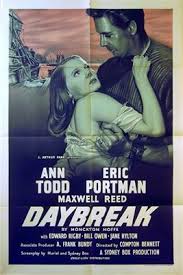
DAYBREAK
UK, 1946, 81 minutes, Black and white.
Ann Todd, Eric Portman, Maxwell Reed, Edward Rigby, Bill Owen, Jane Hylton, Maurice Denham
Directed by Compton Bennett.
Daybreak is a brief British melodrama from the mid-'40s. It was written by Sydney and Muriel Box and directed by Compton Bennett (The Seventh Veil, King Solomon's Mines). It is a melodrama about a hangman who has a double identity as a barber, as the heir to a barge company on the Thames. He meets a wandering girl, Frankie, marries her and takes her to the barge. In the meantime he still functions as the executioner. Eric Portman is the hangman. Ann Todd is the woman. Maxwell Reed also appears as a Danish sailor to whom she is attracted. He precipitates the crisis of the film and the extremely sombre ending. Edward Rigby is in support as the elderly bargeman. Maurice Denham can be glimpsed at the end as an inspector. A very serious piece of film writing - especially for entertainment in the mid-'40s.
1. Impact of the film? In its time? Now? Human drama and issues?
2. Black and white photography, British locations, the river? Prison? The musical score?
3. The title and its ironies, executions at daybreak, Eddie and the disasters that he experienced at daybreak?
4. Themes of responsibility, capital punishment, crime, guilt and innocence, identity, relationships?
5. The structure of the film: Olaf to be executed, Eddie as executioner? His inability to perform the execution? The puzzle for Olaf? His breaking down and telling his story?
6. Eddie and his work as executioner, efficient? As barber and his separate identity? His inheritance, proving his identity? Bill and his support? The chance encounter with Frankie, taking her home, his love for her? Life on the barge and his good management? His still going on the executions, keeping it a secret from Frankie? Going to the barber shop, his friend there? His not being suspicious of Olaf? The delayed execution, his return home, the confrontation between Frankie and Olaf and himself? The fight and his falling overboard? Surviving? At the barber shop? The discovery of Frankie's killing herself? Olaf being condemned? His being the executioner? Crisis of conscience?
7. Frankie, the wanderer, friendship with Eddie in the pub? Going with him, setting up house, her enjoying her life? The attraction of Olaf, her fears, being left alone? The friends and the card nights, Eddie's phone calls? Going dancing? Olaf and his continued attentions? Her asking Bill to stay? The confrontation, Eddie's death, the police interrogation, her blaming herself, killing herself?
8. Olaf, the Dane, working on the barges? Self-assurance, attraction to Frankie, pursuing her, the dances, the romance, at the barge? The fight with Eddie, condemned to death?
9. The barber shop and its style, barbers and customers? The barge and the life on the river, Bill, the pubs? The sailors?
10. Authentic atmosphere - but grim entertainment?
Published in Movie Reviews
Published in
Movie Reviews
Tagged under
Saturday, 18 September 2021 19:22
Dave
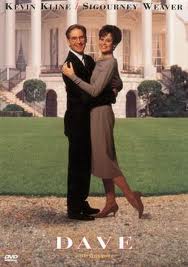
DAVE
US, 1993, 110 minutes, Colour.
Kevin Kline, Sigourney Weaver, Ben Kingsley, Frank Langella, Ving Rhames, Charles Grodin, Laura Linney.
Directed by Ivan Reitman.
Dave is a film of the early '90s which indicates that they still made films `like they used to'. This film is very reminiscent of James Stewart in Mr Smith Goes to Washington and the many films which were in its tradition. It is a pleasant star vehicle for Kevin Kline, much less manic than in his roles in such films as A Fish Called Wanda and I Love You to Death. Sigourney Weaver is more subdued, also, as the president's wife. Frank Langella makes a very good villain. There are a number of guest roles and cameos including Charles Grodin as Kline's friend and live appearances from Arnold Schwarzenegger, Jay Leno, Oliver Stone and a great number of serving American politicians.
The film is also a serious comedy for recession times of the early '80s with a focus on unemployment. Kline portrays a selfish president as well as the genial Dave who is hired for an evening to take his place and who, eventually, has to take on his role.
There is a heart-on-sleeve optimism of the liberal kind about the heart-warming approach that Dave takes to his job - and a critique of the economic rationalism of the '80s. The film was directed by Ivan Reitman, best known for the Ghostbuster films as well as the Schwarzenegger vehicles Twins and Kindergarten Cop. This film is more in the vein of his legal murder mystery, Legal Eagles, with Robert Redford and Debra Winger.
1. The tradition of Mr Smith Goes to Washington, liberal perspectives, heart-on-sleeve optimism, a film for the recession and for times of unemployment.
2. The Washington locations, the White House, the interiors? The musical score?
3. The title and its ordinariness? Yet the film with the real-life politicians - as well as the personalities and the film stars?
4. The president, self-preoccupied, his work with Bob Alexander and Allen, his disdain of the public? The cold relationship with Ellen? His attitude towards Dave and his taking his place? The secretary, the stroke? His being kept alive - his final death and burial? His political stances, manipulated by Bob, by Allen?
5. The contrast with Dave and his concern about jobs, working with Murray, persuasive at getting people with jobs? Going home and finding the Secret Service? Agreeing to the task, being groomed like the president, practising his performance? His impersonation, the public response, saying words when told not to?
6. Their persuading him to stay and be president, the argument about going through the red light to save one's mother, saving the nation? His being coached, words put in his mouth - especially in relationship with Ellen? The excuse of the stroke for his mistakes? His change, pleasant attitude, rapport with people, visits, baseball? The reaction of the media and the comments on his change? (And the spoofs of media programs?)
7. Bob and Allen and their manipulation of Dave? Dave and his beginning to see through Bob, Bob and his lust for power, control, disdain of ordinary people? The contrast with Allen and his humanist speeches? The threat about the financial scandal? Sending the vice-president away, circulating rumours? Dave and his discovery of the truth about Bob, the confrontation and his firing him? Bob exposing the president to the public, the television and the inquiries, the crowd with Bob, his being exposed?
8. Allen as speech writer, loyalty to Bob, manipulation, admiration of Dave, change, helping him to expose Bob?
9. The Secret Service man, his loyalty to Dave - helping him see the president, with Ellen - and the finale?
10. Ellen - her relationship with the president, hard, her beginning to notice differences, in the car, with the children and Dave and his magic tricks, her anger when hearing the budget was cut? The trick question to find out who he was, her introduction? Assisting him at presidential functions? Going out with him - and his having to impersonate the president for the police - and their not thinking she did a good job? The decision to leave? Admiration for the vice president, the plan? The attack, the stroke, the funeral? Her arriving to volunteer to work with Dave?
11. Maurie, his company, friendship with Dave, not believing him about being president, helping with the budget cuts?
12. Dave and his success, the image of a president, relation with kids, cutting the budget, the bonds with Ellen, the accusations - and his discovering they were true? Meeting the vice-president, talking things over? The plan?
13. The vice-president, on tour, his story, the shoe shop, a man of integrity, his taking over as president?
14. The Congress sequences, the confession, the long speech - and the acknowledgment of responsibilities?
15. A political American film of the '90s with its heart on its sleeve?
Published in Movie Reviews
Published in
Movie Reviews
Tagged under
Saturday, 18 September 2021 19:22
Daughters of Cain, The
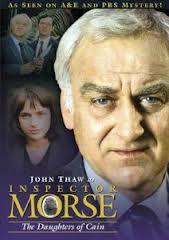
THE DAUGHTERS OF CAIN
UK, 1996, 105 minutes, Colour.
John Thaw, Kevin Whately, Phyllis Logan.
Directed by Herbert Wise.
The Daughters of Cain is an Inspector Morse story, made after the series came to an end. But the popularity of John Thaw as Morse and Kevin Whately as Lewis meant that other telemovies were made from Colin Dexter's novels. The film was directed by veteran Herbert Wise (director of many British telemovies and such series as Rumpole).
The murders take place in Oxford, which is attractively photographed. There is a mixture of the world of the university as well as the more ordinary life of Oxford. The usual characters are present, especially James Grout as the head. However, the screenplay is full of mid-'90s economic rationalism, downsizing as well as mobile phones and Internet.
Phyllis Logan (Secrets and Lies, Another Time, Another Place) is effective as the schoolteacher who murders the boorish husband of her friend.
The film has all the intricacies of the mysteries of the Morse series as well as the development of the characters, especially of Morse and Lewis themselves.
1. The popularity of the long-running series? Television movies? With style? The popularity of Morse and his personality, enigmatic and mannered style? The personality of Lewis? Their relationship? The solving of the crimes? Intricacy of the plot? The psychological dimensions, the mystery and clues? Police work and solving the mysteries with their own abilities? The work of Colin Dexter?
2. The Oxford settings, the city and landscapes, the cityscapes, the buildings? Comments about Oxford and Oxford society? The ironies about Oxford and the dons? The university city? Ordinary people? Their interconnections? So much beauty – and so much crime?
3. The quality of the mysteries, character-driven? Sufficient information, sufficient clues? The exploration of character and clues?
4. John Thaw as Morse, his personality, the changes over the years, yet remaining the same? The mystery of his name? His crusty manner, the bachelor (but romantic at times)? His own authority – exercised over Lewis – and his reaction to authorities? Promotion or not? The changing of his attitudes towards Lewis, bossing him, patronising him about education and culture? The issue of music? Drinking ale? His car? Quietly at home, at work? With Lewis, understanding the situations and characters, the deductions? His being a good listener – but critical?
5. The contrast with Lewis, the family man, the ordinary policeman, education and lack of education, his being put down by Morse – but enjoying his comeuppance now and again? Music and his ignorance? The first reactions, Lewis being patient? His admiration for Morse, having to do so much leg work, to formulate hypotheses? Working under pressure? Collaborator and partner of Morse?
6. The police authorities in Oxford? The medical examiners – and Morse and his attitude towards the female authorities? Sexist and patronising? Changing?
7. The quality of the film as a crime thriller, a thriller with intelligence and demands on the audience?
8. The introduction to the crime, the credits, the background in Oxford, beyond?
9. The range of personalities, motives? Truth and concealment? Jealousies? Deceits and angers? The academic and religious backgrounds?
Published in Movie Reviews
Published in
Movie Reviews
Tagged under
Saturday, 18 September 2021 19:22
Daughters Courageous
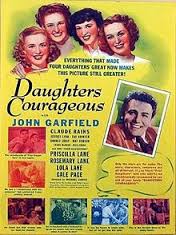
DAUGHTERS COURAGEOUS
US, 1939, 107 minutes, Black and white.
Claude Rains, John Garfield, Jeffrey Lynn, Fay Bainter, Priscilla Lane, Rosemary Lane, Lola Lane, Gale Page, Donald Crisp, May Robson.
Directed by Michael Curtiz.
Daughters Courageous is the second in a series of romantic dramas made by Warner Bros at the end of the '30s. The first was Four Daughters, the third was Four Wives. All films were directed by Michael Curtiz.
However, Daughters Courageous does not exactly fit into the series. Rather, it used the same cast and similar story to the other films which are literally sequels.
The film focuses on a New England family, the four daughters of a family, their relationship with their mother and her fiance. The father, absent for 20 years, returns - and he is paralleled with a young delinquent who is in love with one of the daughters. It is very much '30s soap opera material - but done with flair.
The film was written by Julius J. Epstein and Philip G. Epstein, writers of many Warner Bros films at the time - most notably Casablanca. The characters were based on characters created by Fannie Hurst (Back Street).
The cast is strong, particularly an unlikely Claude Rains as the wandering father. Fay Bainter is the mother. John Garfield is the delinquent. The Lane sisters and Gale Page are the daughters.
The film seems very dated now - but shows us rather vividly, Hollywood style, what was considered modern in the late '30s.
1. Enjoyable soap opera material, '30s style? American families, relationships, marriage, romance, marriage breakdown? Crises?
2. Black and white photography, Warner Bros production values? New England setting? The strong cast?
3. The title, the focus on the daughters, their experience, relationship with their parents?
4. Nan Masters and her household, her experience of marriage, the 20 years absence of her husband? Her attitudes towards him? Her love for her daughters, her relationship with each of them, their devotion to her? Her birthday? Her management of the household? Relating with their maid? The return of her husband, the turmoil in the house? Her ignoring him? The dependability of Sam, the irresponsibility of Jim? The incidents in the house, the daughter and her relationship with Gabriel, her wanting to break up the romance? The other daughters and their acting, engagements with businessmen etc? The American household? Nan and her experience, the courtesy of Jim on her birthday with the flowers, his intervening in the marriage? His finally going? Her love for Sam?
5. Jim Masters, his absence, his return, his daughters snubbing him - yet finding ways to talk things over with him, listening to his wise advice, his interventions? their not wanting to let the others know? His interest in Gabriel, seeing the parallels with himself, helping him, finally urging him to leave? And their going off together? The comic touches, the serious touches? The motivation for his absence? The credibility of Claude Rains in this role?
6. Gabriel and John Garfield's style, in the town, fishing, love for the daughter, in jail, delinquent? Yet wanting to change, in love with the daughter, gatecrashing? The discussions with Jim, his determination, the plan for the elopement? Jim persuading him to leave - and their going off together?
7. The daughters, their relationship with each other, friendships? Fooling around? Their attitude towards their father's return - ignoring him, yet getting to understand him, appreciating his advice and interventions? Their relationship with Sam and their love for him? Their love for their mother and the concern? The men in their lives - on the beach and humour, in the house and meals, the play and its performance, the fiance who was worried about business deals? American daughters of the period - echoing and embodying the values of the time?
8. The maid, her rousing on people, being the butt of jokes - yet her cranky but lovable interventions in their lives?
9. The men - in the town, their work, putting on the play, business? At the family celebrations? In love with the daughters? Bases for marriage?
10. The perennial elements of this kind of story - marriage, marriage break-up, suffering and enduring, reconciliations, support? The parallels between the generations?
Published in Movie Reviews
Published in
Movie Reviews
Tagged under